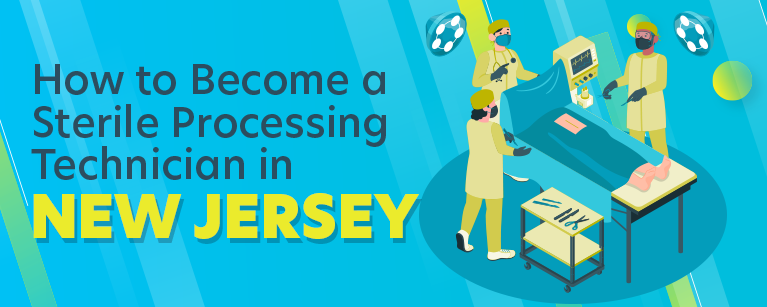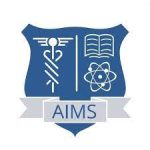
Sterile processing technicians, also known as central service technicians, play an essential role in the day-to-day function of hospitals, medical facilities, surgical centers, and research laboratories.
They help prevent the spread of disease and infection by cleaning, sterilizing, and storing medical equipment in a safe, effective, and sterile manner.
Could this be the career path for you? We’re about to find out!
Table of Contents
How to Become a Sterile Processing Technician – Step by Step
Most states in the US don’t require sterile processing technicians to obtain a state-issued license – New Jersey being one of them.
However, they do require you to enroll in a postsecondary training program, complete an internship, and obtain a national certification from one of two accredited organizations.
Becoming a sterile processing technician can take anywhere from 2 to 4 years, but the time spent learning the trade will pay itself off once you obtain your certification and begin working in the field.
Don’t worry; we’ll detail everything you need to know about becoming a sterile processing technician in NJ.
Obtain a High School Diploma or GED
To pursue a sterile processing technician career, New Jersey residents must obtain a high school diploma or GED to ensure they have the basic academic skills necessary to succeed in the SPT field.
It also ensures they have a basic understanding of medical terminology and other concepts.
Some of the high school classes an aspiring sterile processing technician should pay attention to are health sciences, anatomy, computer science, technology, biology, and chemistry.
For those who don’t have a high school diploma, you can earn a GED by passing the test – either online or in-person.
Enroll in a Postsecondary Training Program
A postsecondary training program is the best way to introduce yourself to the sterile processing technician career.
Programs can be found in colleges, universities, and other accredited organizations that offer certificates upon completion.
The most popular SPT training programs in the New Jersey area include:
- Medical Center Institute
- Rowan College
- American Institute of Medical Science and Education
- Marie’s Allied Health & Technical Institute
- Berkley College
- Americation Career and Training School
Most training programs will take anywhere from a few months to a couple of years to complete and will cost anywhere from $1,500 to $8,000+, but they’ll teach you everything you need to know to start a career as a central service technician and will prepare you for the next step in the process – an internship.
Complete an SPT Internship
Now that you have the skills and knowledge to succeed as a sterile processing technician, you can start to gain some valuable on-the-job experience through an internship – which is usually completed at a hospital, medical facility, or surgery center.
Most clinical internships last between 250 and 400 hours.
Internships not only give you the hands-on experience needed to learn the trade, but they’re necessary for obtaining a national certification – more on that below.
Just make sure the internship is recognized and supported by the Healthcare Sterile Processing Association (HSPA) – formerly known as the IAHCSMM.
Obtain National Certification
While New Jersey doesn’t have a statewide licensing program for sterile processing technicians, most employers will require you to obtain an SPT certification at the national level before working as an SPT professional.
There are two accrediting bodies offering certifications for SPTs in the United States:
- Certification Board for Sterile Processing and Distribution (CBSPD)
- Healthcare Sterile Processing Association (HSPA) [formerly IAHCSMM]
The CBSPD requires aspiring SPTs to have at least one year of experience in the field or a certificate from a Sterile Processing Technician Training Course.
Meanwhile, the HSPA requires you to complete 400 hours of on-the-job experience – which must be confirmed and verified by your manager/supervisor.
Start Looking for Job Opportunities
Now that you’re a certified sterile processing technician, you can officially begin to look for work in the field – if you don’t already have a job lined up from your internship.
We also recommend that you connect with other SPT professionals to start building a network of like-minded individuals.
Some organizations that are designed to connect you with other SPT professionals include:
- Healthcare Sterile Processing Association (HSPA)
- Association of Surgical Technologists (AST)
- Association for the Advancement of Medical Instrumentation® (AAMI)
- The SPD Network
Job search engines like Indeed, ZipRecruiter, LinkedIn, and Glassdoor are valuable tools when looking for a job – allowing you to filter listings by area, field, and more.
Of course, you can always go the traditional route and bring your resume to a local hospital, medical facility, surgery center, or research laboratory.
Sterile Processing Technician Schools in New Jersey
As we explained above, the best way to get your feet wet as a sterile processing professional is through an educational, technical, or vocational training program offered by colleges, universities, and other accredited organizations across New Jersey.
Let’s take a look at some of your best options in NJ:
Medical Center Institute
- Location: 901 West Park Ave Suite 201, Ocean Township, NJ 07712
- Program: Sterile Processing Technology
- Course Length: 32 weeks (8 months)
- Tuition Cost: n/a
Located just minutes from the Atlantic Ocean and one hour from New York City, the Medical Center Institute (MCI) offers a Certificate of Completion for those who pass the 32-week program.
They have day and evening classes available, which contain 40 quarter credits, 29 weeks, and 712 clock hours.
American Institute of Medical Science and Education (AIMS Education)
- Location: 4500 New Brunswick Ave, Piscataway, NJ 08854
- Program: Sterile Processing Technician
- Course Length: 10 months (26 credit hours; 400 clinical hours)
- Tuition Cost: n/a
Located 40 minutes northeast of Trenton, NJ, and 45 minutes southwest of New York City, the American Institute of Medical Science and Education offers a 10-month SPT program that teaches surgical terminology, human anatomy, sterile processing, microbiology, infection control, safety, and more.
Marie’s Allied Health & Technical Institute
- Location: 863 Hamilton ST, Somerset, NJ 08873
- Program: Certified Registered Central Sterile Technician
- Course Length: 52 weeks
- Tuition Cost: n/a
Located just 30 minutes northeast of Trenton, NJ, and 50 minutes from New York City, NY, Maries Allied Health & Technical Institute (MAHTI) offers a 52-week SPT program that rewards you with 400 classroom hours and 400 externship hours (800 hours total).
Classes take place on Tuesday and Thursday evenings.
Berkeley College
- Locations: 44 Rifle Camp Rd, Woodland Park, NJ 07424 (Woodland); 536 Broad St, Newark, NJ 07102 (Newark); 430 Rahway Ave, Woodbridge Township, NJ 07095 (Woodbridge)
- Program: Surgical Processing Technician
- Course Length: 30 weeks
- Tuition Cost: $23,200
With a location near Staten Island and two others near East Rutherford, Berkeley College offers an SPT program that meets IAHCSMM requirements.
The program can be completed in as little as 30 weeks, and students are required to earn 33 semester credit hours before graduating with a Certificate of Completion.
Americation Career and Training School
- Location: 24 Commerce St #401, Newark, NJ 07102
- Program: Sterile Processing Technician (SPT)
- Course Length: 2 months
- Tuition Cost: between $1,200 and $1,400
Located in the heart of Newark, NJ – just 25 minutes west of New York City – Americation Career and Training School offers an online SPT training program that only takes two months to complete and costs $1,200 – up to $1,400 with a payment plan.
Students will earn a Certificate of Completion once finished.
| School Name | Address |
|---|---|
| Medical Center Institute | 901 W Park Ave Suite 201, Ocean Township, NJ 07712, United States |
| American Institute of Medical Science and Education (AIMS Education) | 4500 New Brunswick Ave, Piscataway, NJ 08854, United States |
| Marie’s Allied Health & Technical Institute | 1543 NJ-27 Suite 14, Somerset, NJ 08873, United States |
| Berkeley College | 3 E 43rd St, New York, NY 10017, United States |
| Americation Career and Training School | 24 Commerce St #401, Newark, NJ 07102, United States |
Sterile Processing Technician Salary in New Jersey
Sterile processing technicians make an average of $45,322 per year (between $39,982 and $50,521) in the United States – but New Jersey residents are cashing in with a $49,895 average annual salary (between $44,016 and $55,618).
If you’re interested in a rewarding career path with competitive pay in New Jersey, a sterile processing technician could be just what you’re looking for.
Annual Salary Range:| Location | Avg. Annual Salary |
|---|---|
| Newark | $51,304 |
| Jersey City | $53,253 |
| Paterson | $52,256 |
| Elizabeth | $51,304 |
| Edison | $50,851 |
| Woodbridge | $50,851 |
| Dover | $51,553 |
| Hammonton | $48,061 |
| Trenton | $49,434 |
| Camden | $48,096 |
Regional Salary in New Jersey
| Region | Employed | Avg. Annual Salary | Avg. Hourly Pay | Top 10% Annual Salary | Bottom 10% Annual Salary |
|---|---|---|---|---|---|
| Atlantic City-Hammonton, NJ | 80 | $51,670 | $24.84 | $65,560 | $39,070 |
| Trenton, NJ | 70 | $57,650 | $27.72 | $123,100 | $35,250 |
* Employment conditions in your area may vary.
Frequently Asked Questions
How long does it take to become a sterile processing technician in New Jersey?
After receiving a high school diploma or GED, aspiring SPTs generally spend 1-3 years in a training program and internship before obtaining a national certification.
Do New Jersey residents need a state-issued license to become a sterile processing tech?
No, New Jersey has no statewide licensing program for sterile processing technicians.
How many internship hours are needed to become a certified SPT in New Jersey?
To become HSPA certified, aspiring SPTs must complete 400 internship hours.
Sterile Processing Technician Info by State
- Alabama
- Alaska
- Arizona
- Arkansas
- California
- Colorado
- Connecticut
- Delaware
- Florida
- Georgia
- Hawaii
- Idaho
- Illinois
- Indiana
- Iowa
- Kansas
- Kentucky
- Louisiana
- Maine
- Maryland
- Massachusetts
- Michigan
- Minnesota
- Mississippi
- Missouri
- Montana
- Nebraska
- Nevada
- New Hampshire
- New Jersey
- New Mexico
- New York
- North Carolina
- North Dakota
- Ohio
- Oklahoma
- Oregon
- Pennsylvania
- Rhode Island
- South Carolina
- South Dakota
- Tennessee
- Texas
- Utah
- Vermont
- Virginia
- Washington
- West Virginia
- Wisconsin
- Wyoming









